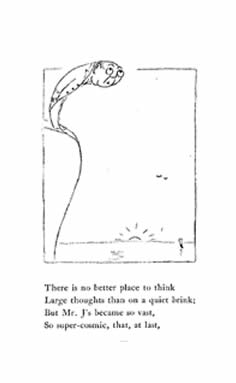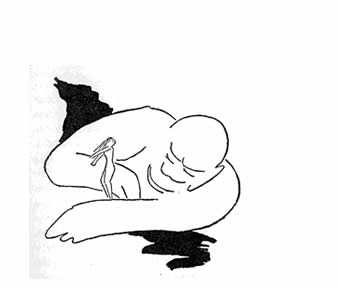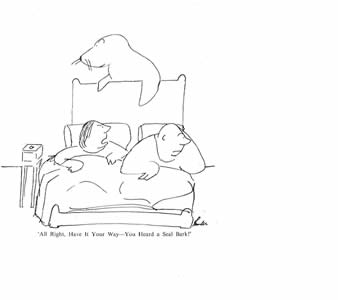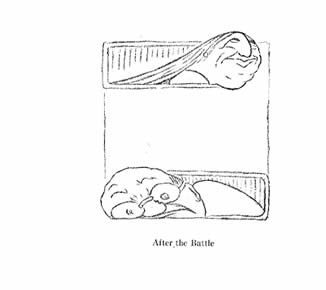| 03 from
The Nature of the American Male chapter, 8 x 9cms. Unconscious
Drawing , " Here the masculine sense of Ironic Detachment
rises superior to the Love Urge, and can take it or let it alone."
A cod version of over-inflated Symbolic Programmes by such artists as
Elihu Vedder. Other images from The Best of Clarence Day. Many
share a sort of wary misogyny with Thurber, e.g. After the Battle
by Day.
I have grouped these two illustrators together because I believe Day influenced
Thurber, and that both were the illustrator without pretensions, unafraid
to make marks.
Clarence Day was one of that fine generation of American humourists that
flourished after 1919. In the Oxford Book of Humorous Prose
OUP 1992, Frank Norden describes Day's career and reprints sections from
Life With Father . I have Day's illustrated Thoughts
Without Words published by Knopf in New York and London in 1928.
It shows the extent to which Day found a naive style of drawing, almost
jotting down with an all-pervading melancholy images to accompany his
prose pieces.. Day had retired from the navy because of ill-health and
took to writing - initially stories of well-to-do New York folk in the
1880's. Their early publication in the New Yorker led to an immediate
jump in circulation and to the flourishing of Day's career.
Bottom right, the classic Thurber - It is safe to say that his drawings
didn't get much better, while Thurber's did. Thurber also found a way
of harnessing his prose to the drawings, usually with beautifully turned
captions. Not a word wasted. Thurber
made his mark first with Is Sex Necessary Or Why You feel the
Way You Do , a joint production with his great friend E.B.White
(two New Yorker staff members). My edition is the London edition of 1930.
The edition prints 52 drawings by Thurber. Two main themes are identified
by White in a fascinating note at the end of the book - "the melancholy
of sex", and the "implausibility of animals". They differ
markedly from his later drawings.
.
|



















